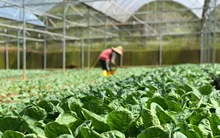
The latest findings from the UN Environment Programme’s Food Waste Index Report 2024 have laid bare the staggering scale of food wastage worldwide. According to the report, a staggering 1.05 billion tonnes of food were squandered in 2022 alone, with approximately 19 percent lost at retail, food service, and household levels. This wastage is compounded by an additional 13 percent lost in the supply chain, from post-harvest to the point of sale, as estimated by the UN Food and Agriculture Organization (FAO).
Inger Andersen, Executive Director of UNEP, denounce food waste as a "global tragedy," highlighting its profound impact on both the global economy and pressing environmental issues such as climate change, biodiversity loss, and pollution. With most food waste originating from households, accounting for a staggering 631 million tonnes, efforts to tackle this issue must be prioritized at every level.
Alarmingly, the report reveals that the problem of food waste is not confined to affluent nations. Despite differences in income levels, there is minimal variation in average levels of household food waste between high-income, upper-middle-income, and lower-middle-income countries. However, a notable divergence arises between urban and rural populations, with rural areas generally wasting less, possibly due to practices such as food scrap recycling for animal feed and composting.
Moreover, the report highlights a concerning correlation between food waste levels and average temperatures, particularly in hotter countries. Factors such as increased consumption of perishable foods and challenges in food preservation exacerbate food wastage in regions prone to extreme heat events and droughts. Given that food loss and waste contribute significantly to global greenhouse gas emissions, reducing emissions from food waste is imperative for combating climate change.
Despite these challenges, the report offers a glimmer of hope, pointing to successful public-private partnerships in countries like Japan and the UK, which have achieved substantial reductions in food waste. These examples underscore the potential for change when concerted efforts are made to address the issue.
Published ahead of the International Day of Zero Waste, the UNEP Food Waste Index Report serves as a wake-up call, urging governments and stakeholders to take decisive action. By adopting measures to reduce food waste and embracing sustainable practices, countries can work towards achieving the Sustainable Development Goal 12.3 of halving food waste by 2030.
With collaboration and commitment, there is hope for a future where food waste is minimized, and its detrimental impacts on both society and the environment are mitigated.
Access Full Report Here: Food Waste Index Report 2024










